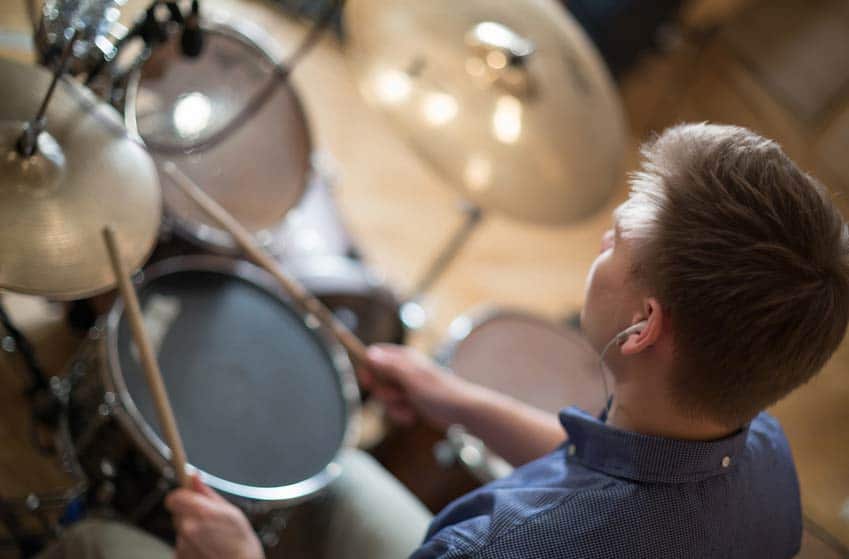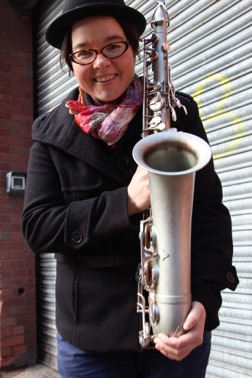Music Career Finder
Survey Start
Session Musician
Career Overview
A Session Musician performs a backing track for another musician, while performing onstage or recording in studio.
Alternate Titles
Studio Musician, Backing Musician
Avg. Salary
$54,600
Salary Range
Varies widely, can go up to $100,000

How To Become a Session Musician
- Career Description
- Salary
- Career Outlook
- Career Path
- Experience & Skills
- Education & Training
- Additional Resources
- Sources
Career Description
A Session Musician backs another artist during live performances or in the studio. He or she must be able sight-read and to perform several different genres. Session Musicians are self-employed, so when not performing, they have day-to-day administrative tasks like basic accounting, staying in contact with other musicians about projects, and of course, practicing.
Session Musicians work with Producers, Bandleaders, Recording Artists and other musicians.
Salary
The average annual salary for a Session Musician is approximately $54,600. The salary range for Session Musicians varies widely and can go up to $100,000+ annually.
Session Musicians work on a project-by-project basis. Unions organize rates for musicians, but the pay range can vary greatly depending on the project.
Hey, what do you think about trying our new Music Career HelperMusic Career Helper really quick? It’s totally free and could help get your career moving fast! Give it a try. It’s totally free and you have nothing to lose.
Career Outlook
”I do lots of things so I work a lot,” says Glasson, who also books gigs, writes arrangements, produces and mixes recordings, designs show fliers and album art, and writes library music, in addition to her work as a session musician.
“Everyday I’m answering emails or the phone, but I often have 4-7 gigs a week, and a couple of sessions, often from home. This has built up by word of mouth, but when I was a teenager, I was out every night meeting and playing with as many bands and musicians that I could.”
So, being a Session Musician is all about the hustle. There are no set hours; you could be onstage at night and in the recording studio the next morning.
Glasson said you have to see yourself succeeding, even if you feel like you’re failing.
“Believe you can do it, be positive!” she said. “If you feel you played badly on a session or could do a better solo, but they are happy with it, keep your mouth shut, as it’s what they want!”
Career Path
In this career, advancement means either building a greater reputation or getting a higher pay rate. “You can build up your network to get more sessions,” advises British Session Musician Charlotte Glasson.
Rates vary based on the project and its budget. “There is a musicians union rate, but sometimes it’s less, but often it’s more, as you have been brought in specially,” she says. “Also I get more money if I play more instruments! I often go for £100 an hour, if not more depending on who it is for.”
Networking is crucial to growing a career–and for branching out into film or commercial music, too.
Glasson says, “A lot of work has come my way through a guy I met when I was 17 and in a soul band with him. He has recommended me for The Lost and Found Orchestra, and this has led to playing and fixing sections for the 3D films by Yes/No Productions (The Last Reef, Wild Ocean, Shark 3D etc) or playing viola on the cult film A Field in England.”
As the old saying goes, “it’s all who you know.” The best way to get a job as a Session Musician is to simply get out there and play with as many people as you can.
Building relationships in this matter helps you prove your skills, as well as proving that you’re reliable, punctual and easy to work with so that when a major artist with a connection to your friend’s band suddenly needs a tuba player, your friend can recommend you. Let people know that you’re available, by building a personal network, maintaining a professional website, and putting up posters or cards at local studios.
For more info on how to find gigs, check out our blog.
- “Go hang out [at] gigs.”
- “Put cards up in studios.”
- “Record your band or have professionally recorded music of you playing so you can push that and people can hear you play.”
- “Get on the phone, internet, etc. and book some gigs, as I’ve met most people for sessions through playing live.”
- “Get an internet presence.”
Experience & Skills
Experience performing music is obviously essential—not just for technique, but also for the networking opportunities that will get you jobs. Most Session Musicians have their own bands.
As for skills, Glasson says, “I think you need to be cool-headed and confident, and not get too star-struck, as then you can’t think to the best of your ability. I’ve got a lot of work from playing in various bands, and people meeting you and digging your playing.
“Reading music is a total benefit, as is playing by ear and being adaptable, and also understanding what the artist wants. No point playing a jazz solo on a rock track–keep it simple!
“I remember working with Jah Wobble and he said ‘no jazz’ on my improvised sax solo, so you’ve got to be able to interpret that, and not get annoyed that he doesn’t want ‘jazz.’ I get booked a lot as I can play so many instruments that I can be a one-woman woodwind section or string section, or can book other players to make a string section.”
Personality-wise, Glasson says, “You’ve got to be reliable. Turn up on time, well, actually turn up really early so you have time to deal with traffic jams, train delays, parking etc. I work a lot with Herbie Flowers, the Bass Player from ‘Walk on The Wild Side’ by Lou Reed. He is always about 2 hours early on everything.
“So he’s never late, can be chilled, get a cup of coffee, eat something, etc., as often it can involve a lot of hanging around, but you don’t always have time to go out and grab a sandwich as you are on call. You’ve got to be able to deal with a lot of pressure.
“One session I did for a BBC series involved top session players from the BBC concert orchestra. There was one section that the flute player couldn’t get right, so we repeated it tons of times. You don’t want to be the one that ruins the take when they finally get it right, so you’ve got to be focused.”
To be successful, a Session Musician must be amiable and driven enough to build and sustain their own network of potential collaborators.
“People think that if they can play well then it will just happen,” Glasson said.
“You’ve got to be a person that someone wants to spend time with, i.e. if you have spent ages practicing in your bedroom, but can’t make small talk, and make people feel at ease, or [act] too arse licky they won’t want to work with you. It takes a lot of hard work and some luck.”
Education & Training
Higher education isn’t strictly necessary, but an in-depth knowledge of music theory and technique is. It’s also beneficial to play a wide range of instruments.
Glasson says, “I’m classically trained, but I grew up improvising, so I have the benefits of being able to sight read music (very handy in session world as studio time is expensive!) but can also play by ear and make up arrangements on the spot to harmonise along with to make a fuller sound.
“I’m primarily a Jazz Musician, and that involves having good technique, and lots of experience of different types of popular music and styles, which again is essential, as the way you feel different styles can be very different. [The] best education can be [had] by going to different music gigs, hanging out and playing with loads of bands, and learning different musicians’ approaches and ‘language’ for communicating in.”
Additional Resources
Glasson is a member of several organizations in the UK, which have helped her connect with people offering jobs and helped her get royalties paid. She is a member of Performing Artists Media Rights Association (PAMRA), Phonographic Performances Limited (PPL), the Performing Right Society (PRS for Music), and the Musicians’ Union.
In North America, the American Federation of Musicians of the United States and Canada is the big one. There are many smaller, local unions musicians can join in their community, too.
She recommends that Session Musicians “have a website, SoundCloud, Facebook artist page so people can see what gigs you have coming up, see who you’ve worked with and hear you play. Also, Twitter is good to connect with fans and people that you might not personally know. “
Sources

Charlotte Glasson
Charlotte Glasson is a UK-based Session Musician, Bandleader, and Multi-instrumentalist. A classically trained jazz musician, she plays a wide range of instruments, including saxophone, flute, clarinet, violin, percussion, and even the musical saw.
As a session musician, Glasson has performed alongside Oasis, Julian Lloyd Webber, Nick Cave & the Bad Seeds, Unkle, Ladyhawke, Bill Laswell, and Nigel Godrich. She has appeared at venues around the globe, including the Sydney Opera House, the Royal Albert Hall, and the Thailand International Festival.
You can read more about Glasson’s career in The Stage and Sussex Jazz Magazine.